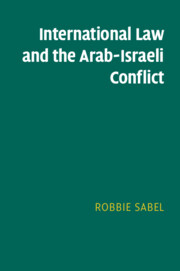Book contents
- International Law and the Arab-Israeli Conflict
- International Law and the Arab-Israeli Conflict
- Copyright page
- Contents
- Abbreviations
- Introduction
- 1 Is International Law Relevant?
- 2 The World War I
- 3 The Zionist Movement and the 1917 Balfour Declaration
- 4 Post–World War I and the 1922 League of Nations Mandate for Palestine, 1920–1947
- 5 The 1947 Partition Plan
- 6 Israel’s Declaration of Independence
- 7 The 1948 Arab-Israeli War
- 8 1949 Armistice Agreements
- 9 The Arab Refugee Problem
- 10 The 1967 Six Day War
- 11 UN Security Council Resolution 242
- 12 Camp David 1978
- 13 1979 Egypt–Israel Peace Treaty
- 14 Taba Arbitration
- 15 The Legality of Israeli Exploitation of Oil from Sinai
- 16 The Oslo Accords
- 17 Israel–Jordan
- 18 Post Oslo Developments
- 19 The Status of the ‘West Bank’ (Judea and Samaria) and the Gaza Strip
- 20 Israeli Settlements in the West Bank
- 21 Controversial Elements of Military Administration
- 22 Freedom of Navigation through International Waterways in the Region
- 23 Israel–Syria
- 24 Jerusalem
- 25 Controversial Laws of War Issues
- 26 Is Palestine a State?
- 27 Water Resources
- 28 Implications for Future Negotiations
- Index
26 - Is Palestine a State?
Published online by Cambridge University Press: 21 April 2022
- International Law and the Arab-Israeli Conflict
- International Law and the Arab-Israeli Conflict
- Copyright page
- Contents
- Abbreviations
- Introduction
- 1 Is International Law Relevant?
- 2 The World War I
- 3 The Zionist Movement and the 1917 Balfour Declaration
- 4 Post–World War I and the 1922 League of Nations Mandate for Palestine, 1920–1947
- 5 The 1947 Partition Plan
- 6 Israel’s Declaration of Independence
- 7 The 1948 Arab-Israeli War
- 8 1949 Armistice Agreements
- 9 The Arab Refugee Problem
- 10 The 1967 Six Day War
- 11 UN Security Council Resolution 242
- 12 Camp David 1978
- 13 1979 Egypt–Israel Peace Treaty
- 14 Taba Arbitration
- 15 The Legality of Israeli Exploitation of Oil from Sinai
- 16 The Oslo Accords
- 17 Israel–Jordan
- 18 Post Oslo Developments
- 19 The Status of the ‘West Bank’ (Judea and Samaria) and the Gaza Strip
- 20 Israeli Settlements in the West Bank
- 21 Controversial Elements of Military Administration
- 22 Freedom of Navigation through International Waterways in the Region
- 23 Israel–Syria
- 24 Jerusalem
- 25 Controversial Laws of War Issues
- 26 Is Palestine a State?
- 27 Water Resources
- 28 Implications for Future Negotiations
- Index
Summary
The Palestinian Authority defines itself as the State of Palestine and has the outward organs of an independent State. The State of Palestine conducts foreign relations, albeit the Oslo accords prohibited the Palestinian authority from doing so. Some States will not recognise another State if it was created as a result of an illegal action. This may be relevant to the consideration of whether Palestine should be recognised as a State. It is a subject of controversy as to whether the State of Palestine has a sufficiently effective government and defined territory to be considered a State in accordance with classical international law definitions. It can be argued that the large number of States and international organisations that recognise and treat Palestine as a State overcomes such deficiencies. The issue of whether Palestine is, at present, a State remains controversial.
- Type
- Chapter
- Information
- International Law and the Arab-Israeli Conflict , pp. 390 - 399Publisher: Cambridge University PressPrint publication year: 2022

